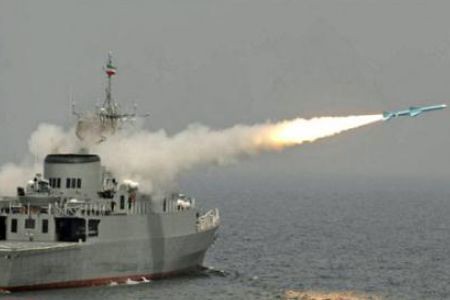
Iran naval manuevers in the Straits of Hormuz could be a warning that it can block oil shipments through the strategic waterways. Iran has been under threat from the US and Israel., a photo by Pan-African News Wire File Photos on Flickr.
U.S. rejects Iran warning on moving carrier to Gulf
The possibility of a confrontation between the United States and Iran appeared to grow Tuesday after the Obama administration dismissed an Iranian warning against moving a U.S. aircraft carrier into the Persian Gulf, saying the deployment was crucial to "the security and stability of the region."
By Jonathan S. Landay and Kevin G. Hall
McClatchy Newspapers
PREV of NEXT
KENNETH ABBATE / US NAVY
The Nimitz-class aircraft carrier USS John C. Stennis is seen in the Straits of Hormuz in November. Iran warned it would take unspecified action if U.S. ship re-enters the Gulf.
Related
Top comments Hide / Show comments
No comments have been posted to this article.
Start the conversation >
WASHINGTON — The possibility of a confrontation between the United States and Iran appeared to grow Tuesday after the Obama administration dismissed an Iranian warning against moving a U.S. aircraft carrier into the Persian Gulf, saying the deployment was crucial to "the security and stability of the region."
Fears that a crisis could disrupt Gulf tanker traffic carrying 40 percent of the world's seaborne oil drove international petroleum prices up by more than $4 a barrel, a potential threat to U.S. and global economies struggling to emerge from recession.
The rising tensions come as the U.S. and Europe target Iran's crucial oil revenues for the first time in an intensification of sanctions against Tehran for rejecting repeated U.N. demands to halt its nuclear program. The program is widely thought to be secretly developing nuclear arms, which Iran denies.
The Iranian currency, the rial, plunged to a record low against the U.S. dollar, reportedly triggering a run on banks by Iranians anxious to convert their savings into the American currency before the exchange rate worsens.
Gen. Ataollah Salehi, the Iranian army chief, warned that Iran would take unspecified action if a nuclear-powered aircraft carrier, the Bremerton-based USS Stennis — which leads a strike group of five warships — re-enters the Gulf. The carrier departed the waterway last week as Iran conducted naval exercises.
"We recommend and warn the aircraft carrier not to return to its previous position in the Persian Gulf," Press TV, a state-run English-language satellite news channel, quoted Salehi as saying.
The United States rejected the warning, declaring that "the deployment of U.S. military assets in the Persian Gulf will continue as it has for decades."
"These are regularly scheduled movements in accordance with our long-standing commitments to the security and stability of the region and in supporting ongoing operations," Pentagon spokesman George Little said.
White House spokesman Jay Carney sought to minimize the threat, portraying it as a bid by Iran to divert its people's attention from their worsening economic plight and growing international isolation.
Salehi's comments are "confirmation that Tehran is under increasing pressure," Carney said.
Ian Bremmer, the president of the Eurasia Group, which advises corporations on foreign-policy risks, said he thought the Iranian threat amounted to bluster because of the harm that a confrontation with the U.S. would do to Iran's struggling economy.
But Vali Nasr, a former State Department adviser who's with Tufts University's Fletcher School for international affairs, said Salehi's comment appeared to push tensions to a new level.
"You now have a situation where you could have a cycle of events that could basically escalate into a conflict that neither side may necessarily be planning for," Nasr said.
No comments:
Post a Comment